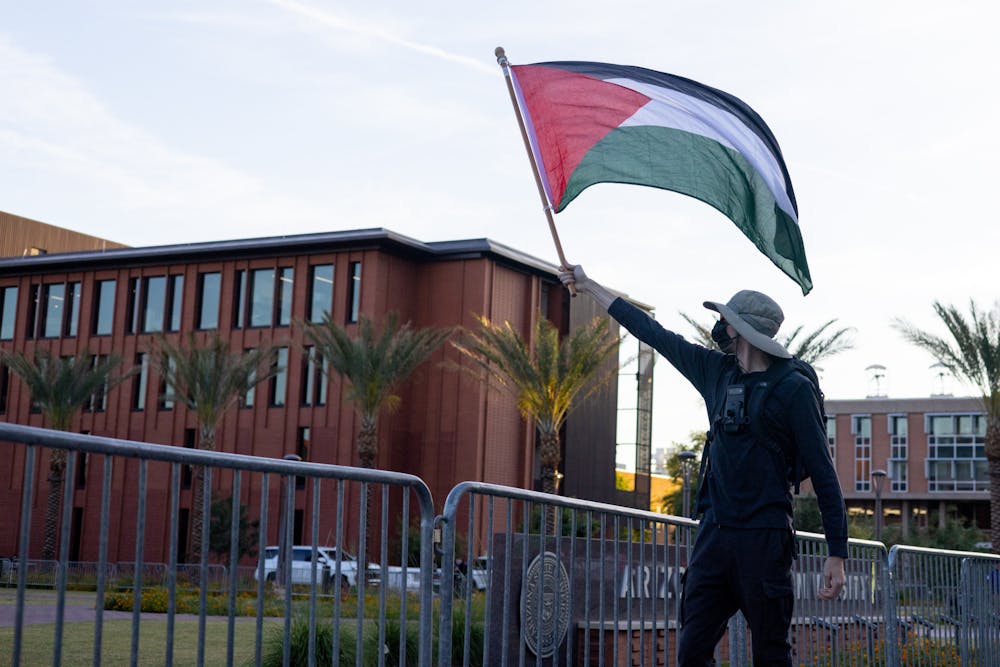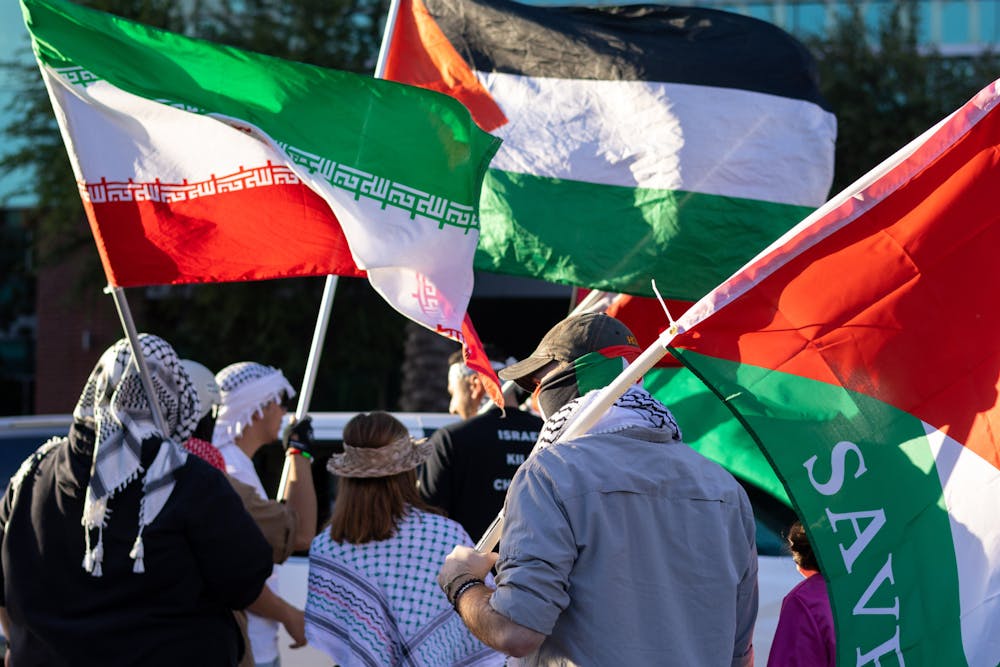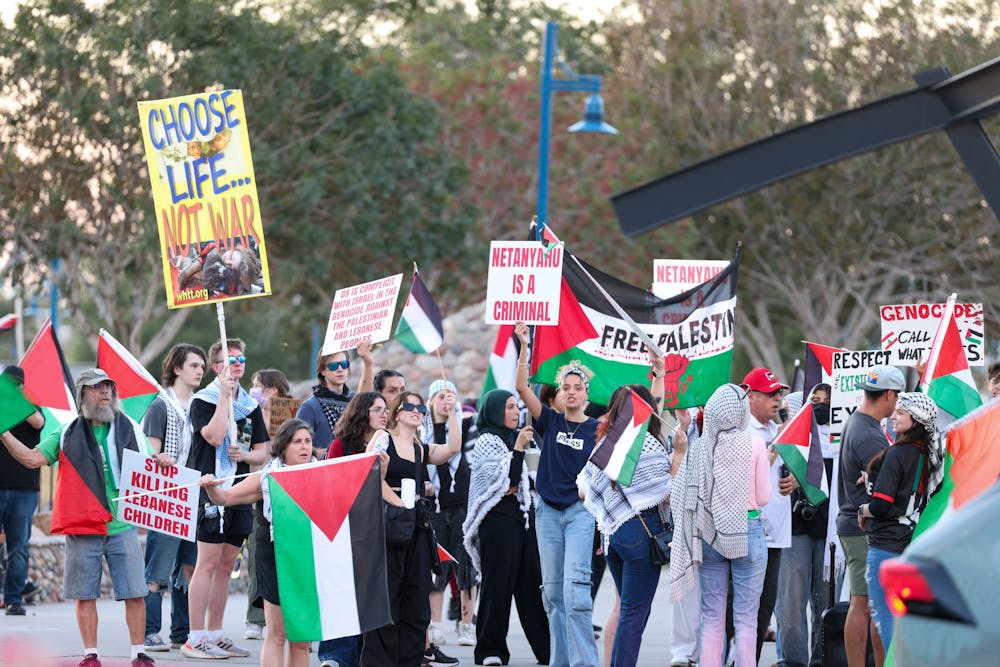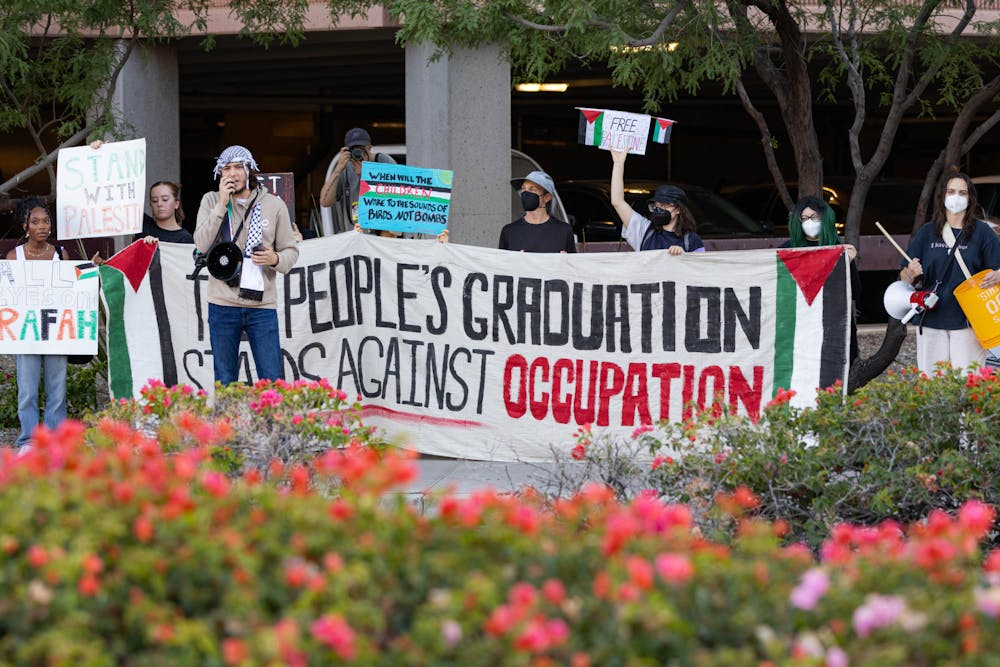I studied for a chemistry exam in the basement of the Memorial Union below the chants and cries of a war protest.
It was a Thursday afternoon, a week after the Oct. 7 attacks in the Gaza envelope of southern Israel. The clashing of pool balls and the shuffle of my chemistry notes were interrupted by rallying cries from the first floor of the MU: "Free, free Palestine! From the river to the sea!"
The poetic call for freedom drew my attention away from the exam, and I made my way to the student pavilion. There, a majority of the assembly waved green, white and red flags, while a smaller group held blue and white flags printed with the star of David. Other passersby joined me in forming a circle to watch the protest before us, like a congregation gathering around a preacher.
READ MORE: Pro-Palestine protesters march after the anniversary of Oct. 7, emphasize need for peace
I did not know why there was such an outrage. I had the impression that Palestine had been in conflict with Israel for a long time, and that protesting a decades-long struggle seemed futile.
However, I preferred to do my research before forming an opinion, so I turned to the ASU Library for a better understanding. I dove into every article and book I could find in the ASU system. Questions ran through my head about Oct. 7: Why were global protests currently erupting? Why was the land of Jerusalem, sacred to Jews, Christians and Muslims for centuries, and its neighboring region, garnering worldwide attention?
Despite my reading efforts, I eventually learned far more about these issues from the people I shared conversations with.
Story of Sedo Sa'ad Akkad and Sayyida Khadiga Elfurra
During lunch with my friend Omar Elaqad, a third-year student studying mechanical engineering and a Palestinian-American, I asked him what he thought about the protests. Our conversation revealed that the demonstrations were drawing attention to the long history of violence against Palestinians. I told Omar I wanted to learn more about Palestinian culture, specifically what Palestinians felt about the global discourse, so he invited me to talk to his grandfather and grandmother, who had emigrated from Palestine to the United States in their late twenties.
When I visited Sedo Sa’ad Akkad, Omar’s grandfather, he shared memories of a Palestine quite different from today. Bayt Dajan, a Palestinian village about 6 kilometers southeast of Jaffa, was where Sedo Akkad was born in 1936. From there, he traveled with his father to various cities such as Khan Younis, a city in the southern Gaza Strip.
In Khan Younis, Sedo Akkad recalled that Jews, Christians and Muslims lived "together as one family" without conflict. They worked together, shared meals and spent time together, with no discussions of race or religious background — everyone was simply Palestinian.
In the 1930s, hundreds of thousands of Jewish immigrants fleeing Europe and Asia had arrived in British-ruled Palestine, buying large plots of land. Sayyida Khadiga Elfurra, Omar’s grandmother, and Sedo Akkad explained that British colonialists offered many incentives like homes and other bribes to encourage Jewish people to move to the area. Sayyida Elfurra noted that along with the influx, British colonial policies heightened tensions with native Arab people by favoring Zionists and dividing Palestinians along religious lines.
The outbreak of World War II in 1939 intensified these conflicts over the next decade, eventually leading to the Arab-Israeli War of 1948. The violent displacement and ethnic cleansing of Palestinians during this war is known as Al-Nakba — The Catastrophe.
Sedo Akkad remembered that some had taken up arms while others fled to safer areas like the Gaza Strip. Many of Sedo Akkad's friends had been executed outside their homes, and his father-in-law, who was a merchant, had his goods confiscated. Sayyida Elfurra mentioned families often buried jewelry along the Mediterranean beaches to protect their valuables.
On May 14, 1948, Jewish leaders in modern-day Tel Aviv drafted the Declaration of the Establishment of the State of Israel. Sedo Akkad described the brutality that followed, which separated families and expelled Palestinians from their homes, forcing them into refugee status across the West Bank, Gaza Strip, Lebanon, Jordan and Syria.
Sedo Akkad and his wife married in 1956 after growing up as neighbors in Gaza, where they went on to raise three children. He recalled how Israeli forces seized many of Sayyida Elfurra's wedding belongings, such as her bridal dress and jewelry, amid Israel's nation-building efforts.
"They (did) not allow us to go back to our house if we wanted to go; we have (no) visa," Sedo Akkad said. "Only, they don't give us visa even (if) we have our houses and land and whatever. You can't go fight governments by yourself."
In the Egyptian military-ruled Gaza, Sedo Akkad faced social and economic challenges in the densely populated area. In search of better income, he took a teaching position at an international school in Kuwait. After just a year living there, he returned to Gaza in 1963 to move his family to Kuwait.
As I received drinks and boxes of cookies from Sayyida Elfurra despite my resistance, I realized that her and Sedo Akkad were living alone in their home. I asked where their siblings and parents were now. Sedo Akkad shared stories about his family, but he told me that he had not visited Gaza since moving to Kuwait and later to the United States. Sayyida Elfurra had left with Sedo Akkad for Kuwait, so she had a similar answer.
Grateful for their insights, I thanked Sedo Akkad and Sayyida Elfurra for their time and left their home with an armful of cookies, water and dates.
Story of Khalto Haneen Wishah
Palestine’s history did not end when Sedo Akkad left in 1963. I knew there was more to the story.
A couple of nights after my interview with Sedo Akkad and Sayyida Elfurra, I visited the Islamic Community Center of Tempe, a mosque associated with the Muslim Student Association at ASU. Coincidentally, this is where I met Ghassan Elsaqqa, the eldest of five siblings who fled Gaza after Oct. 7. I told him about my research on Palestine, and he invited me to meet his mother, Khalto Haneen Wishah, who warmly welcomed me into their apartment in Tempe.
READ MORE: Muslim Student Association at ASU sends letter of criticism to President Crow
Khalto Wishah was born in 1985 in the Al-Bureij refugee camp, located on the eastern side of the Gaza Strip. It had been nearly two decades since the 1967 Arab-Israeli War, which resulted in much of Palestine coming under Israeli control. She had earned a degree from the Jordan University of Science and Technology before returning to Gaza to be with her family.
As a projects officer at Al Awda Health and Community Association, one of the largest non-governmental healthcare organizations in Gaza, Khalto Wishah witnessed constant bombardments in the region. Despite the resulting poverty and despair, she spoke of the enduring generosity and hospitality of the Palestinian people.
"My whole life in Gaza, my memories, my friends, my connections," Khalto Wishah. "I love most the generosity and hospitality of people, how they are connected to each other, how they feel each other. You cannot imagine after each bombardment, everybody is hurrying to this place to help and to give support. This is the most astonishing thing in Gaza."
Khalto Wishah spoke about the critical importance of the Mediterranean Sea, explaining that for those in Gaza, the sea served not only as a refuge but also as a sacred space for prayer, where many connect with God to shares hopes and offer gratitude for his creations.
When I asked Khalto Wishah if Gaza had always been as it is now, she told me that even though she had lived through the First and Second Intifadas, both marked by severe violence, the living conditions were much worse after Hamas came to power in 2006. The Israeli blockade on Gaza restricted access to medicine, essential goods and travel. Khalto Wishah's father, who had publicly called for peace, spent 15 years in Israeli prisons. Her children lost many friends, including Ghassan's soccer teammate who was killed days after Khalto Wishah's family fled Gaza.
In response to the turmoil around them, many families in Gaza had a bag hanging from the walls of their home containing a pair of clothes for each family member and any legal documents necessary for travel. Khalto Wishah had to use this bag on Oct. 7, 2023.
Originally, the plan had been for the children to go on a picnic that day with their friends, and later, one of Khalto Wishah's daughters would perform Dabke, a Levantine folk dance, at a family club in the city. Instead, at 6 a.m. in Gaza City, the sounds of missiles surrounded Khalto Wishah's home near Al-Shifa Hospital. After two sleepless nights, she received a call from the Israeli Occupation Forces, more generally known as the Israel Defense Forces, telling her to relocate her family immediately. Over the next week, Khalto Wishah and her husband frantically searched for safety across Gaza City.
After hearing news that Khalto Wishah's cousin and nieces were killed in an attack at the Deir al-Balah refugee camp, which had been labeled a "safe zone", fear overcame her family. On Oct. 13, Khalto Wishah's family arrived at a Nuseirat refugee camp. In the subsequent days, civilian infrastructure was attacked, and people cried for help under the rubble. On Oct. 24, another bombing of a neighboring house sent shockwaves through Khalto Wishah's home, causing the walls to collapse and glass to shatter across the floor. Her family huddled under their dining table, uncertain if they would live to see tomorrow.
While Khalto Wishah and her family struggled to survive, her sister living in Arizona applied for their immigration. Khalto Wishah's second-oldest son, Mohammad, already had U.S. citizenship as he was born in Michigan while she was visiting the U.S. This allowed her family to complete an intake form with the U.S. Embassy, granting them each a visa to stay in the U.S. amid the ongoing conflict. On Nov. 3, 2023, Khalto Wishah received a call around 7 a.m. informing her that she had been approved for a flight to the United States, provided she could reach the southern border safely.
Khalto Wishah hesitated to leave Gaza, particularly since her parents could not go with her. However, her father collected her passport and urged her to get in the car. He drove her to the Egyptian border, risking his own life in the process. Now, with her voice trembling and tears in her eyes, Khalto Wishah tells me she still feels guilty about leaving her parents behind, and that she does not know if they are still alive.
"It's not about Hamas, it's not about October (7th)," Khalto Wishah said. "It's only civilians and innocent people who were killed, who were targeted."
Eventually, she hopes to return; reconnecting with her family, friends and roots.
"There is no place like home," said Khalto Wishah. "Gaza is the most fantastic, wonderful place I have seen in my life and I want to go back whenever the aggression ends because this is the place I belong to."
Takeaways
I wanted life to be better for the people of Palestine, but that is not why I did these interviews. Instead, I wanted to understand why the world cared about the Palestinian cause now, but not before. However, it was important, especially as a student, for me to understand that there is not always a simple explanation for everything. In the end, the answer was more complex: I realized that we were all bystanders, in some way or another, of human suffering.
We live privileged lives in comparison to those who suffered, and still suffer, in Palestine. In our shared humanity, perhaps we can find a starting point for true empathy and change — a place where the echoes of suffering could transform into a collective call for peace, and where the silence of indifference could give way to the voices of understanding and action.
Edited by River Graziano, Sophia Braccio, Tiya Talwar and Alexis Heichman.
Editor's note: The opinions presented in this insight are the author's and do not imply any endorsement from The State Press or its editors.
This content was contributed by an author who does not work at The State Press. If you are a community member who would also like to contribute, please email execed.statepress@gmail.com.
Like The State Press on Facebook and follow @statepress on X.







